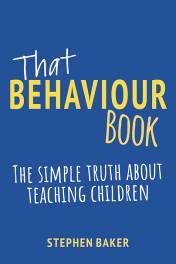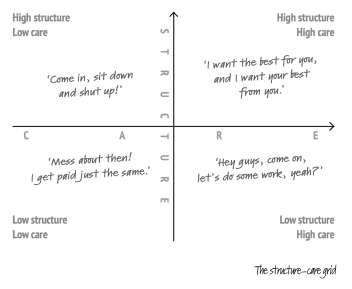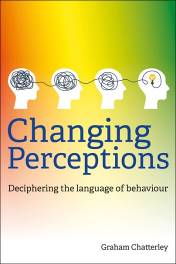Three New Titles from Crown House Publishing

That Behaviour Book:
The simple truth about teaching children
by Stephen Baker
ISBN: 9781785836688
Price: £17.99
Published by: Crown House Publishing
Date of publication: 24th March 2023

An essential book for every teacher, providing an engaging and unique mix of anecdotes, practical strategies and moral imperatives for successful and
child-centred behaviour management.
Stephen Baker explores the simple truth about teaching in his new book,
That Behaviour Book
On our journey through life, we are guaranteed to experience a range of emotions – from excitement and happiness to tiredness, confusion and anger. If our school system is to succeed, we need to understand that children are people with emotions too and strive to lead them with empathy, love and caring consistency.
But the pressure on teachers to deliver good pupil outcomes is immense, whilst the necessity of having to continually deal with misbehaviour can have a serious impact on teachers’ well-being as well as contributing to growing numbers leaving the profession. This is why it’s so important to teach children the behaviour expected of them. Teachers need to be leaders in their classrooms – and good leaders lead rather than manage.
As children’s behaviour improves, teachers begin to enjoy the job again, they sleep better and they go home with some energy left for partners, families and other interests. This, after all, is what life is all about – precious stuff that is crowded out all too easily by worries about the boys in 9FW, which can fill every corner of your mental space, like expanding foam.
In a nutshell, behaviour improves when teachers invest in relationships, establish robust routines and speak calmly to children. It improves when they explicitly teach the behaviour they want to see (just as they teach maths, phonics or geography) when they teach it by means of their own good example and when they teach it by highlighting good behaviour when they see it.
What kind of teacher are you? What is your purpose as a teacher? What values, beliefs and principles do successful teachers have and how do they sustain these in the the face of challenging pupil behaviour? What do you believe about behaviour and how do you think
young people should be disciplined?

These are all questions that Stephen Baker explores in his informative new book, That Behaviour Book. In this book, Steve shares the lessons he has learned as a successful teacher of English and Drama, as a subject leader and head of year, and as a behaviour and attendance consultant. Its unique tone and anecdotes, drawn from years of experience, makes That Behaviour Book a wise friend for busy teachers, providing a sense of connection, challenge and reassurance all at once.
The purpose of this book is to help the adults who read it to put themselves back in charge of the classroom and lead behaviour more effectively. That Behaviour Book is an essential guide for any teacher; it is relevant and helpful to both the beginner and the more experienced teacher who is looking to reset and refresh their approach to teaching.
That Behaviour Book will show teachers how to rapidly improve both their practice and their relationships with pupils and classes. It will help teachers reflect on their own practice whilst sharing helpful tips and tricks to be used straightaway and equipping them with strategies that will bring success in the classroom. There are engaging ‘takeaway’ tasks at the end of each chapter that sum up the key points in the book, alongside practical ‘now try this’ activities to accelerate progress. In short, this book will help teachers learn how to get the very best out of their pupils.
That Behaviour Book reinforces the idea that we need to teach all the children in our catchment area; that children need our help the most when we may feel they deserve it the least. Schools simply cannot keep off-rolling pupils. Steve contends that with consistent adult behaviour based on values, beliefs and principles, we can lead behaviour in an entirely new direction.
Suitable for all teachers.
“Reading this book gave me hope. Hope to believe that there is a better way to teach and support our children, not least those from broken homes and dysfunctional families.”
– Paul Tinsley, Interim Assistant Director of Education, Calderdale
“Steve properly knows his stuff and communicates it brilliantly. His writing drips with authentic experience from a career in some truly wobbly places. Steve’s advice is exactly what you need to upgrade behaviour in your classroom.”
– Paul Dix, author of When the Adults Change, Everything Changes

Stephen Baker spent 17 years in teaching before working with local authorities and for the National Strategies as a regional adviser in Yorkshire and the Humber. He is now a behaviour consultant and trainer, passionate about helping teachers to succeed. Stephen lives with his partner, Sian, in Anglesey where he spends his free time having fun with their children and grandchildren.

“It has the potential to transform primary English teaching for the better, and in conjunction with the other key approaches mentioned, open doors for children, not only to a more rewarding educational experience, but to richer lives.”
– Gordon Askew, MBE, former DfE Reading Adviser, Founder and Chair, English Hubs Council
Opening Doors to Ambitious Primary English Pitching high and including all
By Bob Cox with Leah Crawford, Angela Jenkins and Julie Sargent
ISBN: 9781785836671
Price: £18.99
Published by: Crown House Publishing
Date of publication: 22nd May 2023
Provides both big principles and a toolkit of strategies all carefully selected to support the design of a deeper, more creative and more expansive English curriculum.
Making rich and diverse language and literature accessible to all pupils
We are an inherently challenge-seeking species. We like doing things that are difficult, as long as they are characterised as high challenge and low threat. This is often reflected in the attitudes of pupils in school: they enjoy doing work that stretches them.
There is a tendency in the education sector to simplify the teaching of subjects for too many pupils, whatever their prior attainment, in the mistaken belief that they won’t be able to cope with more complex ideas. In fact, a study from the University of Sussex¹ found that reading challenging, complex novels aloud and at a fast pace in each lesson allowed pupils to improve their understanding of the texts, giving them a more engaged, uninterrupted reading experience over a sustained period.
Feedback from some of the teachers involved in this study showed that they were surprised at the impressive results of the poorer readers, as they had thought that these pupils would not be able to cope with demanding texts. This research chimes with the Opening Doors approach pioneered by English consultant, Bob Cox, supported by his eponymous series of books. The series offers guidance and resources for teachers as they create lesson structures in which every single pupil is immersed in rich and diverse literature and language – pitching high but including all.
When teachers are shifting a gear to offer greater challenge in the classroom it’s not just the materials they offer but also the rationale for offering those materials that matters. Change in professional practice within English teaching will not be embedded until teachers embrace the ‘why’ of a deeper, more creative and more expansive curriculum, as much as the ‘what’. And this is exactly what Bob Cox does with Leah Crawford, Angela Jenkins and Julie Sargent in their inspiring new book, Opening Doors to Ambitious Primary English.

The ideas, resources and case studies in this book will help teachers make primary English vibrant, creative and challenging in the classroom. It will also provide frameworks and principles for any school wishing to be more ambitious in developing pupils’ speaking, listening, reading, writing and thinking skills, with a greater sense of curiosity and more originality.
Supported by the resources and units of work from the wider Opening Doors series, Opening Doors to Ambitious Primary English acts as the ‘lead’ book, explaining and modeling top quality ways of thinking, planning and teaching. It answers questions, offers challenges and enables diverse and ambitious literacy to become the norm within the school setting. It is the opposite of occasionally including an extra challenging unit or offering tricky literary texts to just one group. All pupils are entitled to be taught challenging texts, fascinating poetry, or non-fiction in various styles. All pupils can continue to learn about spelling patterns, word derivatives and grammar within the context and beauty of a text. No one should feel excluded and everyone can aspire to produce excellent work.
The authors aim to show every teacher reading the book that there are numerous creative and fascinating ways of designing an English curriculum to ensure that every single pupil is immersed in rich and diverse literature and language. They hope that all teachers will come away more confident that there are clear route-ways to ambitious English for their pupils, and that they can adapt the principles and strategies into a highway to excellence that suits their school.
Suitable for teachers and curriculum leads in primary settings.
1 Westbrook et al, Just Reading: The Impact of a Faster Pace of Reading Narratives on the Comprehension of Poorer Adolescent Readers in English Classrooms, the University of Sussex (2019).

Having taught English for 23 years, Bob Cox is now an independent education consultant, writer and teacher coach who works nationally and internationally to support outstanding learning. Bob also delivers keynotes for national associations, multi-academy trusts and local authorities, as more schools integrate Opening Doors’ strategies into their curriculum design.

Leah Crawford has 15 years’ experience as a local authority English inspector and adviser, working across both the primary and secondary phases, and now leads the Thinktalk education consultancy. She is an associate tutor on King’s College London’s Let’s Think in English cognitive acceleration programme and also works in support of a European Erasmus project on the assessment of thinking skills.

Angela Jenkins has extensive experience in English education and school improvement having worked as an adviser in three different local authorities and two multi-academy trusts in the last 20 years. She is currently co-chair of the National Association of Advisers in English (NAAE).

Julie Sargent has over 10 years’ experience of working across the whole of the primary sector as an English Consultant. This includes developing bespoke CPD for individual schools, multi-academy trusts and local authorities. She has a particular interest in Early Years/KS1 and using high-quality texts to promote and develop all aspects of English.

“There is brave leadership and fierce curiosity in equal measure in Graham’s book. This book brings his personal experience as well as the latest educational research to help you work with young people with empathy and respect.”
– Mark Goodwin, Director of Behaviour and Wellbeing, The Mercian Trust
Changing Perceptions Deciphering the language of behaviour
By Graham Chatterley
ISBN: 9781785836756
Price: £17.99
Published by: Crown House Publishing
Date of publication: 1st June 2023
Provides everyone working with children a better understanding of the causes of challenging behaviour and what motivates it.
Deciphering the language of behaviour
What if, instead of insisting that children are ‘school ready’, we asked schools to be ‘children ready’? What if, rather than trying to eradicate undesirable behaviour by punishment, we attempted to understand where it was coming from and treated the causes as well as the symptoms? What if we thought as much about the unconscious messages we give in our responses to children as about the ways they challenge us?
Pupil behaviour management has been a concern for teachers from the dawn of time. If a child will not listen and follow instructions, it is very difficult for learning to take place. The trouble is that whilst we may no longer hit children with canes or paddles, we still too often approach behaviour from a purely punitive stance, with demerits, detentions, focus rooms, isolation booths, exclusions and expulsion. What if, instead of seeking to ‘manage’ behaviour, we taught children how to behave appropriately?
The causes of poor behaviour are many and varied: fear, stress, anxiety and the feeling of being overwhelmed can all take their toll. Teaching children how to deal with fear and stress should be part of what we do in the classroom. If we can use our relationships and connections to replace that cortisol with oxytocin (a bonding hormone that plays a huge role in connection and trust) and increase levels of dopamine (the pleasure hormone), then we reduce fear, drive connections and make young people feel loved. If we have pupils who feel good, and know the power of making others feel good, then behavioural mistakes will decrease naturally without the need for a specific behaviour focus.
In his timely new book, Changing Perceptions: Deciphering the language of behaviour, Graham Chatterley examines the motives behind challenging behaviour, detailing ways in which better understanding and empathy can make children feel safer, build their trust and consequently create more effective learners. Changing Perceptions moves the dial on the perception of challenging behaviour in schools. De-escalation is important but it is only part of the process: if we really want to change behaviour, we have to understand it.
Graham Chatterley is an experienced teacher, school leader, trainer and consultant. In this important book, the fruit of many years working with children, teachers and schools, he challenges everyone involved with education to re-examine the most basic assumptions we make about our work. He explores some of those ‘what if’ questions and, using examples from his personal experience, shows how the latest research can inform our practice and how all our dealings with young people can be informed by empathy and respect.
What is important, of course, is not that we shame or blame teachers and schools, but that we show them better ways of doing things. We challenge and change perceptions. Which is exactly what Graham does in this book.

Changing Perceptions sets out why it is so important to teach behaviour and provides practical strategies to deal with the most challenging situations in the classroom and stop the conflict spiral. Graham consistently repeats the message throughout this book that behavioural mistakes are always learning opportunities – and that doesn’t just apply to the pupils. If something isn’t working, it is time for us all to reflect and improve.
Essential reading for teachers, school leaders and everyone working with challenging behaviour.
“Utilising the most contemporary research, supplying a coherent narrative and exploring the lived experiences of families, children and young people, this book is an essential read for everyone working in the education community.”
– Lisa Cherry, Director, Trauma Informed Consultancy Services and author of Conversations That Make a Difference to Children and Young People
Graham Chatterley was a school leader who has since led training for thousands of educators across the North of England. He believes that adults play a pivotal role in the behaviour of students and that a culture of teaching children behaviour, rather than managing it, is key.
For a review copies, by-lined articles or an interview with the author, please contact:
Amy Heighton
aheighton@crownhouse.co.uk
(++44) 01267 211345
Cooperative Learning and the Sustainable Development Goals from Peachey Publications
Short Book Reviews
Hanna Kryszewska, PolandThree New Titles from Crown House Publishing
Tune Into English
Fergal Kavanagh, Italy


